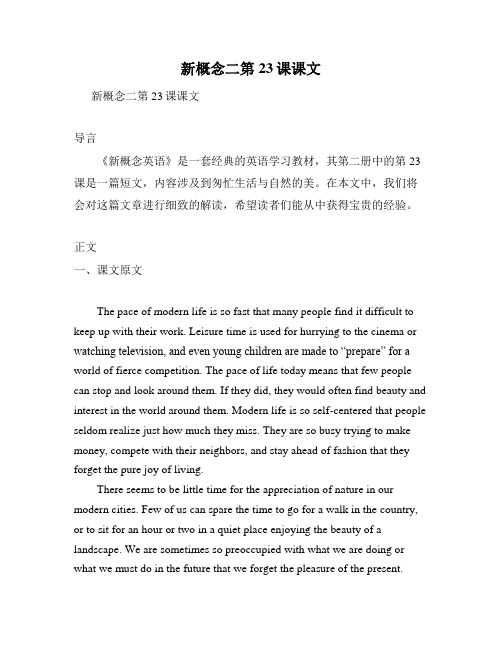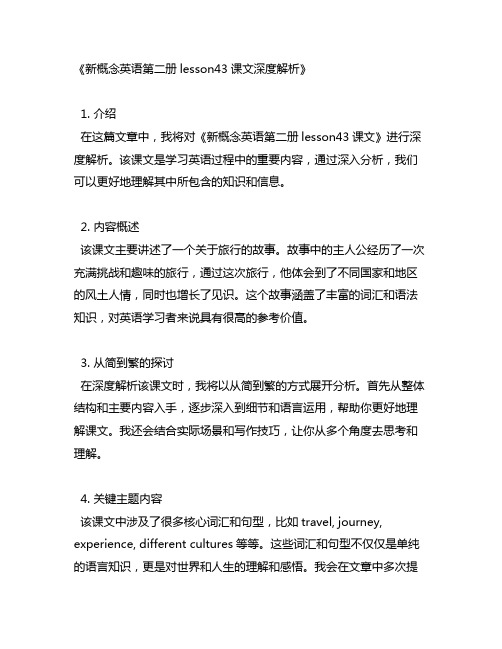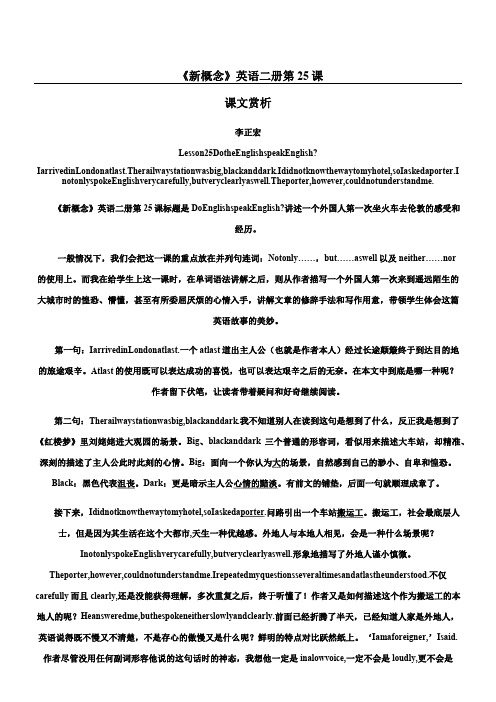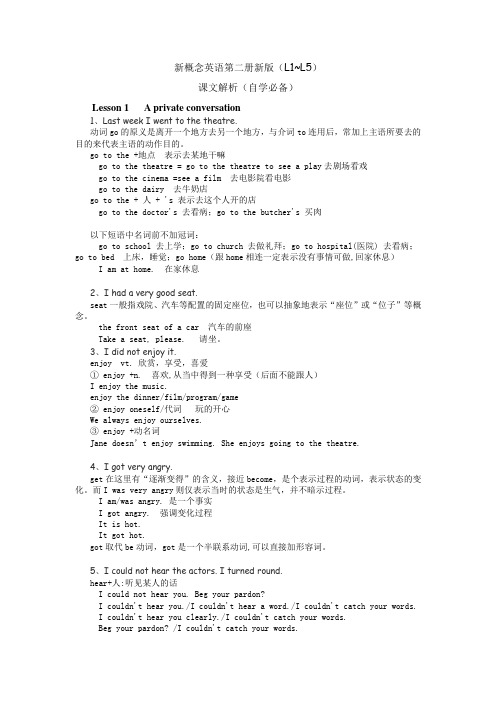《新概念》二册课文赏析
新概念英语第二册课文详解(3)

新概念英语第二册课文详解(3)新概念英语第二册课文详解A large/ great number of our students are Danish.我们的学生中有许多是丹麦人。
There are a small number of spelling mistakes in your homework.你的家庭作业里有少数几个拼写错误。
2.He will soon visit Darwin. 他不久还将到达尔文去。
will 表示将来要发生的事。
这句话的时态是一般将来时。
(cf. 第12课语法)下一句话From there, he will fly to Perth也是一般将来时。
3.My brother has never been abroad before, so he is finding this trip very exciting.我弟弟以前从未出过国,因此,他觉得这次旅行非常激动人心。
(1)这句话由两个简单句组成,后一句由连词so引导,为表示结果的状语从句。
(2)find作“发现”、“发觉”讲时宾语往往带补足语(一般为形容词),说明宾语的状况、性质等:I find the film very interesting.我觉得这电影很有趣。
She found Tom's room very dirty.她发现汤姆的房间非常脏。
She has already found herself wrong.她已经发现自己错了。
需要注意的是,find一词很少用于进行时态,一般用于过去时、完成时及一般现在时等。
课文详注五 Further notes on the text1.Pinhurst is only five miles from Silbury, but Mr. Scott cannot get a telephone for his new garage, so he has just bought twelve pigeons. 平赫斯特离锡尔伯里只有5英里,但詹姆斯·斯科特先生未能为他新的汽车修理部搞到一部电话机,所以他买了12只鸽子。
新概念英语2册课文及详解完美

NEW CONCEPT ENGLISH BOOK 2practice : 训练, progress : 进步If you practice more, then you can make great progress.五项综合训练技能listening : 听力speaking : 说话grammar : 语法 writing : 写作reading : 阅读translation : 译 knowledge +skillsLesson 1 a private con-versation★New Words and Expressions☆private adj.私人的如果妈妈想看你的信,你可以说:It's my private letter.如果陌生人想进你的房子,你可以说:It's my private house.private life 私生活由此引申出privacy n.隐私新东方是private school(私立学校),与此相反,公立学校是public school.所以,private的反义词是public.eg.public 公众;public letter 公开信;public place 公共场所private还有一个值得注意的意思:普通的。
如:private citizen 普通公民;private soldier 大兵我们熟悉的《拯救大兵瑞恩》就是《Private Ryan》☆conversation n.谈话have a + talk/chat/dialogue/conversation/gossip 名词变动词subject of conversation 话题。
(天气是英国人最喜爱的话题)They are having a conversation.几种谈话:talk 内容可以正式,也可以私人Let’s have a talk.conversation 一般用于正式文体中,内容上往往不正式dialogue 对话,可以指正式国家与国家会谈。
新概念二第23课课文

新概念二第23课课文新概念二第23课课文导言《新概念英语》是一套经典的英语学习教材,其第二册中的第23课是一篇短文,内容涉及到匆忙生活与自然的美。
在本文中,我们将会对这篇文章进行细致的解读,希望读者们能从中获得宝贵的经验。
正文一、课文原文The pace of modern life is so fast that many people find it difficult to keep up with their work. Leisure time is used for hurrying to the cinema or watching television, and even young children are made to “prepare” for a world of fierce competition. The pace of life today means that few people can stop and look around them. If they did, they would often find beauty and interest in the world around them. Modern life is so self-centered that people seldom realize just how much they miss. They are so busy trying to make money, compete with their neighbors, and stay ahead of fashion that they forget the pure joy of living.There seems to be little time for the appreciation of nature in our modern cities. Few of us can spare the time to go for a walk in the country, or to sit for an hour or two in a quiet place enjoying the beauty of a landscape. We are sometimes so preoccupied with what we are doing or what we must do in the future that we forget the pleasure of the present.Perhaps we all need reminding that we can all afford to spend a few minutes each day observing the beauty around us. Whether it is a small child playing, a bird in a tree, or just a cloud passing overhead, all these things can give us moments of great joy if we take a little time to notice them.Some of the greatest scientists in the world have been people who have taken infinite pains to observe things that others have not bothered with, and the natural world still presents us with an infinite range of fascinating problems. But man seems to be so preoccupied with his own world that he has neither the time nor the inclination to explore the mysteries that still surround him.二、词汇解析1. fierce competition:激烈的竞争2. landscapes:风景3. preoccupied with:被……所占据4. infinite pains:无穷大的努力5. inclination:倾向三、文章解析本篇文章主要通过对匆忙生活以及现代人对美的认识来探讨大自然的魅力。
Unit-2-The-Company-Man课文解析x

丰富了文学形式和内容 推动了文学的发展和演变 为后来的文学创作提供了借鉴和启示 提高了文学在社会中的地位和影响力
课文中描绘了公司人的生活状态反映了现代社会中职业人士面临的压力和挑战。
课文通过公司人的故事揭示了现代社会中职业发展的趋势和方向对年轻人的职业规划有 指导意义。
课文中公司人的经历和成长展现了现代社会中个人与公司、个人与社会的关系引导人们 思考如何在现代社会中保持自我和独立性。
结局:John失业但决定开 始新的生活
主人公:John
工作态度:认真、严谨、追求完 美
添加标题
添加标题
添加标题
添加标题
性格特点:勤奋、敬业、有责任 感
人际关系:与同事相处融洽乐于 助人
课文通过讲述公司人的生活和职场经历揭示了现代社会对个人职业发展的要求和挑战。
课文强调了职业精神和职业道德的重要性以及个人在职业生涯中需要具备的品质和能力。
情感
课文中的象征: 如“公司人”、 “公司文化”
等
象征的意义: 揭示了公司人 的内心世界和 公司文化的本
质
象征的作用: 增强了文章的 艺术世产生了深远影响 课文中的公司管理方法和策略被后世广泛借鉴和应用 课文中的公司文化对后世企业文化建设产生了重要影响 课文中的公司成功案例对后世企业经营提供了借鉴和启示
照应:课文中提到公司的成功与前文提到的公司创新形成呼应
语言描写: 通过人物 的对话和 独白展现 人物的性 格和情感
行动描写: 通过人物 的行为和 动作展现 人物的性 格和情感
心理描写: 通过人物 的内心活 动和思考 展现人物 的性格和 情感
环境描写: 通过人物 的生活环 境和背景 展现人物 的性格和 情感
环境与人物关系:通过环境描写 展现人物与环境的关系揭示人物 的性格特点和命运走向
新概念英语第二册lesson43课文

《新概念英语第二册lesson43课文深度解析》1. 介绍在这篇文章中,我将对《新概念英语第二册lesson43课文》进行深度解析。
该课文是学习英语过程中的重要内容,通过深入分析,我们可以更好地理解其中所包含的知识和信息。
2. 内容概述该课文主要讲述了一个关于旅行的故事。
故事中的主人公经历了一次充满挑战和趣味的旅行,通过这次旅行,他体会到了不同国家和地区的风土人情,同时也增长了见识。
这个故事涵盖了丰富的词汇和语法知识,对英语学习者来说具有很高的参考价值。
3. 从简到繁的探讨在深度解析该课文时,我将以从简到繁的方式展开分析。
首先从整体结构和主要内容入手,逐步深入到细节和语言运用,帮助你更好地理解课文。
我还会结合实际场景和写作技巧,让你从多个角度去思考和理解。
4. 关键主题内容该课文中涉及了很多核心词汇和句型,比如travel, journey, experience, different cultures等等。
这些词汇和句型不仅仅是单纯的语言知识,更是对世界和人生的理解和感悟。
我会在文章中多次提及这些关键主题内容,帮助你更加深入地理解它们的内涵和用法。
5. 总结与回顾在文章的结尾部分,我会对整篇课文进行总结与回顾。
我会从词汇、语法、情感等多个方面出发,对你进行全面、深刻和灵活的理解辅助。
通过这样的总结与回顾,相信你会对该课文有一个更加清晰和透彻的认识。
6. 个人观点与理解我会共享一些我个人对该课文的观点和理解。
我会结合自己的学习经验和英语学习方法,给出一些建议和建议。
希望这些可以为你在学习英语的道路上提供一些启发和帮助。
结语通过这篇文章的深度解析,相信你对《新概念英语第二册lesson43课文》会有一个更加深入和全面的了解。
在接下来的学习中,希望你可以更加注重实际运用和多角度思考,这样才能真正领略到英语学习的乐趣和意义。
在深度解析《新概念英语第二册lesson43课文》时,首先我们可以从整体结构和主要内容入手。
《新概念》二册第25课课文赏析

《新概念》英语二册第25课课文赏析李正宏Lesson25DotheEnglishspeakEnglish?IarrivedinLondonatlast.Therailwaystationwasbig,blackanddark.Ididnotknowthewaytomyhotel,soIaskedaporter.I notonlyspokeEnglishverycarefully,butveryclearlyaswell.Theporter,however,couldnotunderstandme.Black接下来,Ididnotknowthewaytomyhotel,soIaskedaporter.问路引出一个车站搬运工。
搬运工,社会最底层人士,但是因为其生活在这个大都市,天生一种优越感。
外地人与本地人相见,会是一种什么场景呢?InotonlyspokeEnglishverycarefully,butveryclearlyaswell.形象地描写了外地人谨小慎微。
Theporter,however,couldnotunderstandme.Irepeatedmyquestionsseveraltimesandatlastheunderstood.不仅carefully而且clearly,还是没能获得理解,多次重复之后,终于听懂了!作者又是如何描述这个作为搬运工的本地人的呢?Heansweredme,buthespokeneitherslowlyandclearly.前面已经折腾了半天,已经知道人家是外地人,英语说得既不慢又不清楚,不是存心的傲慢又是什么呢?鲜明的特点对比跃然纸上。
‘Iamaforeigner,’Isaid.作者尽管没用任何副词形容他说的这句话时的神态,我想他一定是inalowvoice,一定不会是loudly,更不会是firmly.Thenhespokeslowly,butIcouldnotunderstandhim.MyteacherneverspokeEnglishlikethat!好委屈!TheporterandIlookedateachotherandsmiled.两个人都笑了,都无奈的笑了。
新概念英语第二册第52课-1课文解析

新概念英语第二册第52课-1课文解析一、课文概述本文是《新概念英语第二册》中的第52课的第一部分,主要讲述了主人公在旅行中遇到的一位陌生人,通过对话和交流,主人公逐渐了解了这位陌生人,并从中获得了一些启示。
本文的结构清晰,语言简练,是学习英语口语和交际表达的优秀材料。
二、重点词汇和语法1. 词汇:本文中出现了一些重点词汇和短语,如“take a chance”、“make the most of”、“figure out”、“give sb a lift”等,需要学习者在阅读和实践中积累和掌握。
2. 语法:本文涉及到的语法点主要包括现在进行时态的用法、宾语从句的构造和用法等。
学习者需要认真理解课文中的句子,掌握这些语法知识。
三、课文解析1. 主题背景:本文的主题是旅行,通过主人公的旅行经历引出了文章的主人公和陌生人,为接下来的对话和交流提供了背景。
2. 角色分析:主人公和陌生人都是文章的重要角色,他们的性格特点和行为方式都为文章增色不少。
通过对话和交流,我们可以更好地了解他们的性格和行为。
3. 语言表达:本文的语言表达非常自然、流畅,符合口语表达的习惯。
通过本文的学习,我们可以提高自己的口语表达能力和交际能力。
4. 文化内涵:本文涉及到了旅行、陌生人、友谊等文化内涵,通过阅读和学习,我们可以更好地了解西方文化和社会风俗。
四、思考与探究1. 思考:在阅读本文之后,我们可以思考一些问题,如“旅行中遇到陌生人时应该如何处理”、“友谊的重要性是什么”等,通过思考这些问题,我们可以更好地理解本文的主题和内涵。
2. 探究:本文涉及到的重点词汇和语法知识比较多,我们可以结合自己的实际情况,尝试运用这些知识进行口语表达和写作练习,提高自己的英语综合运用能力。
五、结语本文是一篇优秀的英语学习材料,通过阅读和学习,我们可以提高自己的口语表达能力和交际能力,同时也可以了解西方文化和社会风俗。
在学习过程中,我们需要认真理解课文中的句子和语法知识,积累重点词汇和短语,并尝试进行口语表达和写作练习,不断提高自己的英语综合运用能力。
新概念英语2课文解析

新概念英语第二册新版(L1~L5)课文解析(自学必备)Lesson 1 A private conversation1、Last week I went to the theatre.动词go的原义是离开一个地方去另一个地方,与介词to连用后,常加上主语所要去的目的来代表主语的动作目的。
go to the +地点表示去某地干嘛go to the theatre = go to the theatre to see a play去剧场看戏go to the cinema =see a film 去电影院看电影go to the dairy 去牛奶店go to the + 人 + 's 表示去这个人开的店go to the doctor's 去看病;go to the butcher's 买肉以下短语中名词前不加冠词:go to school 去上学;go to church 去做礼拜;go to hospital(医院) 去看病;go to bed 上床,睡觉;go home(跟home相连一定表示没有事情可做,回家休息)I am at home. 在家休息2、I had a very good seat.seat一般指戏院、汽车等配置的固定座位,也可以抽象地表示“座位”或“位子”等概念。
the front seat of a car 汽车的前座Take a seat, please. 请坐。
3、I did not enjoy it.enjoy vt. 欣赏,享受,喜爱① enjoy +n. 喜欢,从当中得到一种享受(后面不能跟人)I enjoy the music.enjoy the dinner/film/program/game② enjoy oneself/代词玩的开心We always enjoy ourselves.③ enjoy +动名词Jane doesn’t enjoy swimming. She enjoys going to the theatre.4、I got very angry.get在这里有“逐渐变得”的含义,接近become,是个表示过程的动词,表示状态的变化。
- 1、下载文档前请自行甄别文档内容的完整性,平台不提供额外的编辑、内容补充、找答案等附加服务。
- 2、"仅部分预览"的文档,不可在线预览部分如存在完整性等问题,可反馈申请退款(可完整预览的文档不适用该条件!)。
- 3、如文档侵犯您的权益,请联系客服反馈,我们会尽快为您处理(人工客服工作时间:9:00-18:30)。
《新概念》英语二册第25课
课文赏析
李正宏
Lesson25 Do the English speak English?
I arrived in London at last. The railway station was big, black and dark. I did not know the way to my hotel, so I asked a porter. I not only spoke English very carefully, but very clearly as well. The porter, however, could not understand me. I repeated my question several times and at last he understood. He answered me, but he spoke neither slow ly nor clearly. ‘I am a foreigner,’ I said. Then he spoke slowly, but I could not understand him. My teacher never spoke English like that! The porter and I looked at each other and smiled. Then he said something and I understood it.
‘You’ll soon learn English!’ he said. I wonder. In England, each man speaks a different language. The English understand each other, but I don’t understand them ! Do they speak English ?
《新概念》英语二册第25课标题是 Do English speak English? 讲述一个外国人第一次坐火车去伦敦的感受和经历。
一般情况下,我们会把这一课的重点放在并列句连词:Not only……,but……as well 以及neither……nor的使用上。
而我在给学生上这一课时,在单词语法讲解之后,则从作者描写一个外国人第一次来到遥远陌生的大城市时的惶恐、懵懂,甚至有所委屈厌烦的心情入手,讲解文章的修辞手法和写作用意,带领学生体会这篇英语故事的美妙。
第一句:I arrived in London at last . 一个at last 道出主人公(也就是作者本人)经过长途颠簸终于到达目的地的旅途艰辛。
At last 的使用既可以表达成功的喜悦,也可以表达艰辛之后的无奈。
在本文中到底是哪一种呢?作者留下伏笔,让读者带着疑问和好奇继续阅读。
第二句:The railway station was big, black and dark. 我不知道别人在读到这句是想到了什么,反正我是想到了《红楼梦》里刘姥姥进大观园的场景。
Big 、black and dark 三个普通的形容词,看似用来描述大车站,却精准、深刻的描述了主人公此时此刻的心情。
Big:面向一个你认为大的场景,自然感到自己的渺小、自卑和惶恐。
Black:黑色代表沮丧。
Dark:更是暗示主人公心情的黯淡。
有前文的铺垫,后面一句就顺理成章了。
接下来,I did not know the way to my hotel, so I asked a porter. 问路引出一个车站搬运工。
搬运工,社会最底层人士,但是因为其生活在这个大都市,天生一种优越感。
外地人与本地人相见,会是一种什么场景呢?I not only spoke English very carefully, but very clearly as well .形象地描写了外地人谨小慎微。
The porter, however, could not understand me. I repeated my questions several times and at last he understood. 不仅carefully 而且clearly, 还是没能获得理解,多次重复之后,终于听懂了!作者又是如何描述这个作为搬运工的本地人的呢?He answered me, but he spoke neither slowly and clearly. 前面已经折腾了半天,已经知道人家是外地人,英语说得既不慢又不清楚,不是存心的傲慢又是什么呢?鲜明的特点对比跃然纸上。
‘I am a foreigner,’ I said . 作者尽管没用任何副词形容他说的这句话时的神态,我想他一定是in a low voice ,一定不会是loudly, 更不会是firmly. Then he spoke slowly, but I could not understand him. My teacher never spoke English like that !好委屈!The porter and I looked at each other and smiled .两个人都笑了,都无奈的笑了。
这个无奈有两层意思:一个是笑对方,你怎么这么笨呢?另一个在疑问,你在说什么呀?
‘You’ll soon learn English!’he said . “学着点吧!”他说,俨然一副教训人的口吻。
I wonder .我懵了。
In England ,each person speaks a different language. They understand each other, but I don’t understand them!你们英国人可以随意地说英语,可苦了我们这些外国人!这句话如果直译为“在英国,每个人说一种不同的英语,他们彼此能懂,我却不懂。
”就完全失去了作者原文的意境。
最后发出疑问:Do they speak English? 你们说的到底是不是英语?既是无奈又是愤怒。
这是伟大的亚历山大奉献给我们英语学习者的精美作品,他的文章里蕴藏着作为一个语言学家深厚的文字功底。
倘使我们的老师能把这些精致的描写细细地讲解给学生,让学生感受到英语之美,学起来势必兴趣更加浓厚,理解更加深入!。
